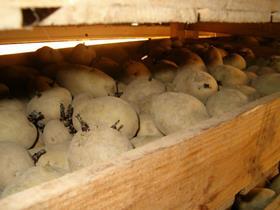
It’s been some time since Britain could boast an array of world-beating products. But in seed potatoes at least, brand Britain still means top quality. The UK climate allows for perfect seed production conditions, with low aphid pressure and long sunlight hours creating a robust product that some consider to be the best in the world. Yet they now face serious challenges from abroad and internally to take advantage of global seed potato shortfalls.
This year growers didn’t escape one of Britain’s toughest production years on record, with a wet spring giving way to drought conditions. Scottish growers avoided the worst of the dry weather, but planting was two weeks late and there are fears that they might break dormancy early due to the heat.
Volumes are tipped to be down overall this year, with exports lower thanks to Egypt’s venture into producing their own seed. “It remains to be seen if this is a successful project,” says Niall Arbuckle, head of seed at Greenvale, “but if it is, it will have a bearing on export volumes from Scotland. Our other export countries were steady, with only slight changes in volume and variety.”
Britain’s continental competitors might not shed many tears over volume drops as global seed potato shortfalls make seed potatoes a hot commodity, sparking fierce trading competition. Britain is in a prime position to capitalise on that, with a reputation for having the best product on the market, but it faces stiff competition from the Dutch – the most prolific seed growers, who also enjoy financial backing from their government – and a Europe-shaped spanner called Brexit.
Will Brexit bite?
The complexities of withdrawing from the EU are so immense that no one really knows what to expect, but there are worrying signals now emerging that a no-deal scenario is becoming a real possibility.
The issues this could raise for seed potatoes are huge. For starters, the UK currently delivers over 20,000 tonnes to the EU, which does not allow any seed imports from outside the bloc. If Britain cannot negotiate a continuation of that then some niche supply companies will face “disaster”, according to Rob Burns, head of seed and export at AHDB.
Furthermore, much British seed is shipped round the world via Rotterdam. If fears are realised of increased customs and checking times, then these additional costs could push the product out of the market.
If there is any plus side, then the falling pound will make exports cheaper. As luck would have it, the countries where non-EU exports go to have low tariffs on seed potatoes. Egypt, for example, has a four per cent rate, a cost which would be wiped out should the pound fall far enough.
Mike Inglis, technical manager at Albert Bartlett, remains concerned however as to how it will affect access to new varieties in the future. “I don’t see it having any positive effects,” he says. “ We only have variety rights for so long, then they become a free variety. It’s about making sure that the new varieties are the latest varieties.”
The African Opportunity
According to Rob Burns, East Africa has real potential for British seed exports as consumers move away from more traditional crops. “They don’t want to eat maize any more, they want to eat wheat and potatoes. In Africa potatoes are seen as a luxury product.”
Currently Kenya, Tanzania and Rwanda are in their sights, with UK varieties now approved for export following a successful trial, which will improve the yields of growers by several tonnes per hectare. “You can open up the market but then it takes a few years for anything to happen so we won’t see any exports this year,” says Burns.
“Tanzania also has a huge shortfall of seed potatoes; they’re cropping seven to 10 tonnes per hectare, while EU seed is 40 tonnes,” he adds. “They were really interested. We haven’t agreed anything formal but we should soon see the likes of SASA and Defra getting links together and plant agreements in place.”
To Russia, With Love
“I’ve said it before, and I’ll say it again, the potential of Russia is huge,” says Rob Burns. The giant has been on the radar for a while after it made exemptions for seed potatoes in its EU fruit and vegetable import ban, a move that will be irrelevant when Britain leaves the EU next year. “Since then almost nothing has moved; the bureaucracy of the process has made things quite difficult,” Burns says.
Currently Russia imports 40,000 tonnes of potatoes from Egypt, which is grown from British seed but Burns suggests they can cut out the middle man with direct supply from Britain to Russia.






No comments yet